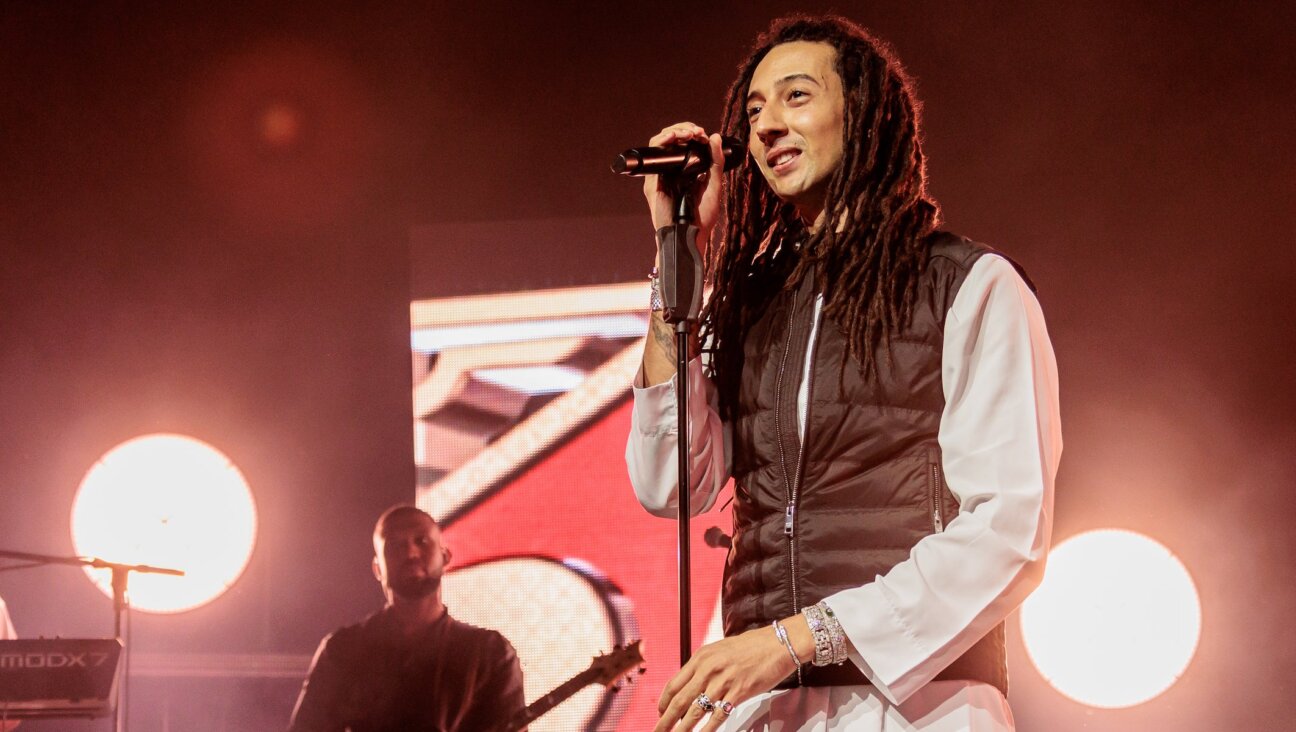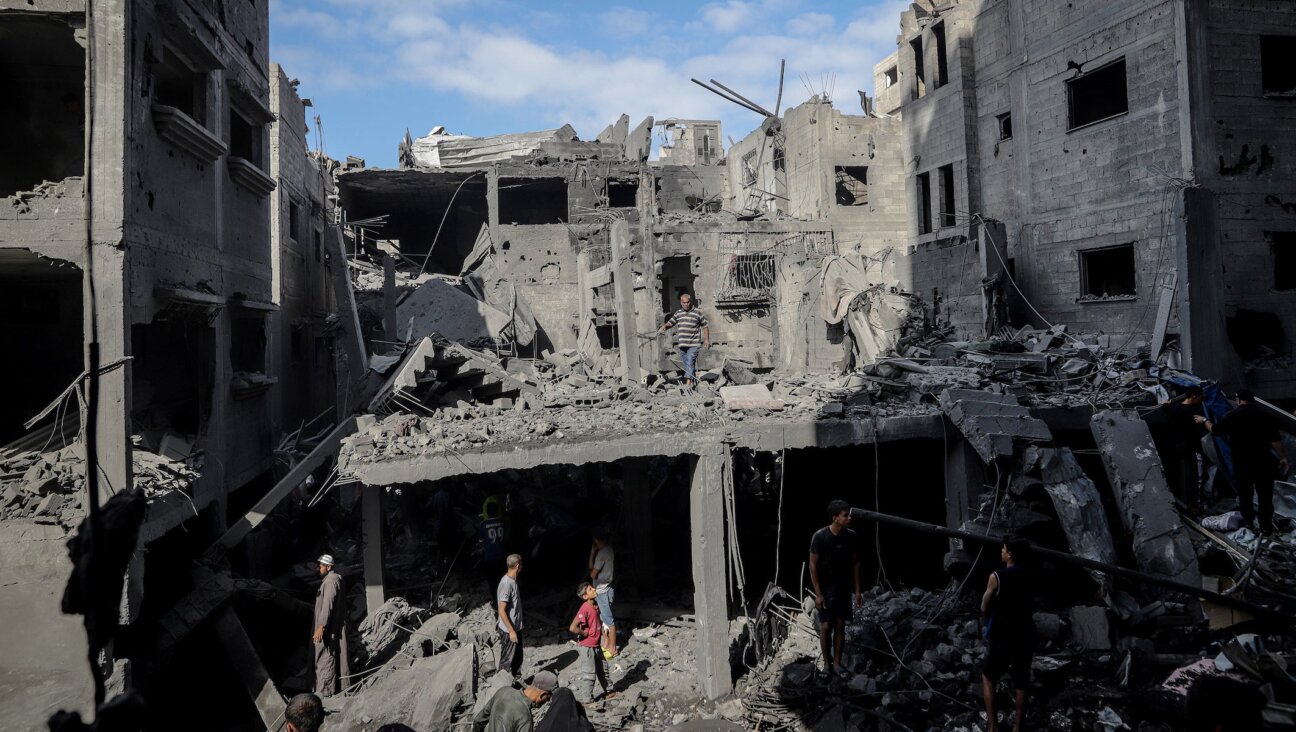New York Yeshivas Get City Funds for Guards — at Cost of $19M

Unguarded? Government funds will pay for security at schools like Yeshiva Boyan Tiferes Mordechai Shlomo School, in Brooklyn, New York. Image by Getty Images
Government funded sentries will soon be guarding nonpublic schools in New York’s five boroughs, thanks to a major victory won by Orthodox Jewish advocates after a year of tough political defeats.
A security guard bill passed by New York’s city council in early December is the first in the country to guarantee religious schools city funding for guards. And while the bill brings less money to religious schools than the tax credit that the same advocates failed to push through the state legislature this year, the bill tacks one more item onto the growing list of services for which New York City’s religious schools can get the government to pay.
“We think this is a national model,” said New York City Council member David Greenfield, the Brooklyn legislator who led the effort. Greenfield spoke as fears about terrorism spiked following the recent attack in San Bernardino, California.
Despite a ban in the New York State constitution on the use of public funds for religious schools, and some First Amendment restrictions, yeshivas, Jewish day schools and other religious education institutions throughout the state already receive significant government aid. Public school districts pay for nurses and for school social workers for religious schools, and for transportation and school safety equipment. Religious schools also get loans of textbooks and computers, and are reimbursed for providing certain state-mandated services, like taking attendance.
All told, dozens of city, state and federal programs offer in-kind services and reimbursements to private religious schools. The new security guard reimbursement, which won overwhelming support in the city council despite opposition from civil liberties advocates, increases that number by one.
The new bill will allow all nonpublic schools with 300 students or more in New York City to be reimbursed for one or more security guards, depending on the school’s size. Security guards must be hired from a list of firms approved by the city and will be unarmed. The city will spend up to $19.8 million on the guards in the first program year alone.
A successful state constitutional challenge to the program seems unlikely. According to Marc Stern, general counsel of the American Jewish Committee, the New York State Court of Appeals, the state’s highest court, has in eight decades not found that any aid program has violated the state constitutional ban on public aid to religious schools.
Many of the same advocacy groups that pushed for the school safety agent bill were also behind an earlier, unsuccessful effort to pass a measure in the New York State Assembly this year that would have given a massive tax credit for donations to nonpublic school scholarship funds. Opponents of that bill argued that its advocates sabotaged themselves by lobbying assembly members too aggressively for support, running negative direct mail campaigns in the districts of friendly lawmakers, and throwing vast sums of money and lobbying resources at the effort.
The effort on the security guard bill in the city council, according to those involved, took a softer approach. “The goal was really more important to us than the optics,” Greenfield said. “The purpose of doing this wasn’t to make noise. It was to get it done.”
An early version of the bill, which the Forward reported on in early June, would have had school safety agents from the New York City Police Department at nonpublic schools. But the city’s influential police commissioner, Bill Bratton, among others, strongly opposed this move. Supporters reworked the bill to provide funds to hire private security guards instead.
The guards will be hired from private firms, but they must be licensed by New York state. According to the bill’s text, the city agents that oversee the program will set rules on training requirements for the guards. What is clear is that the guards will be unarmed. Gregory Floyd, head of the union representing the unarmed safety agents who guard public schools, “scoffed” at the notion that such weaponless personnel could prevent a terror attack, according to an April article in The Chief-Leader, a local paper covering public sector unions.
That has not stopped the bill’s advocates from framing its passage in the context of nationwide fears about terrorism and school shootings. Referring to the slaughter of 20 children and six faculty members at an elementary school in 2012, Maury Litwack, director of state political affairs at the Orthodox Union Advocacy Center, which was the leading backer of the legislation, said: “I think there have been increasing concerns about school safety since the shootings in Connecticut. Every time there’s an anti-Semitic incident in New York City this is also a concern…. This is the kind of thing that adds a drumbeat and a level to this, and created an environment that, with our advocacy, led to the result we had.”
The language in the reworked bill now also requires that the guards be paid a prevailing wage, which helped bring the large building workers union SEIU 32BJ on board as supporters.
“That’s obviously good politics, and something that’s helpful in getting something like this passed,” Litwack said. The bill had 45 co-sponsors out of the city council’s 50 members. Greenfield said that he attracted support for the bill by showing council members which nonpublic schools in their district would benefit.
Other advocacy groups involved in the effort included the Roman Catholic Diocese of Brooklyn, Agudath Israel of America, UJA-Federation of New York, the Archdiocese of New York and the Islamic Schools Association of New York.
In a statement, the Agudah praised the bill’s passage. “At a time when the world all around us is becoming an increasingly dangerous place, it is reassuring to know that our political leaders have joined forces to upgrade the security of our precious yeshivos and other nonpublic schools,” said Rabbi David Zwiebel, the group’s executive vice president.
_Contact Josh Nathan-Kazis at [email protected] or on Twitter,
















